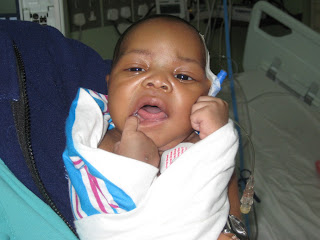We arrived here on Sunday night after leaving DC at 6 PM on Saturday. We escorted two Ugandan children, one mother, and a translator back home from DC, where the kids underwent interventional catheterizations. After a dinner with our colleagues from the University of North Carolina (who include respiratory therapy, ICU care, CT surgery, and perfusion) and a stay near the airport in Entebbe, we drove to the capital city of Kampala and quickly went to work.

We’re working at Mulago, the main medical school and teaching hospital in Uganda. It’s an enormous facility, and walking around, it feels more like a campus than a hospital. On Monday, after setting up the makeshift echo lab, we started screening children. I think we did 30 echos in 6 or 7 hours that day, and all of them had significant heart disease. Even the relatively simple stuff had sequelae we just don’t see in the US. Most of these patients were ones who were most likely to have surgery in Uganda, either on this trip or in the future. We did have a few “unscheduled” patients, including a one month old baby who was as blue as a smurf. He had transposition of the great arteries and severe pulmonary stenosis with almost no VSD or ASD. That's not the kind of thing you expect to show up in your clinic. His oxygen saturation was 40%. Peter Lwabi, the cardiologist here in Uganda, approached us about performing an atrial septostomy. Unfortauntely, there isn’t a stock of catheters in this hospital, as the thought of a cath lab is absurd. Essentially, the next 2 days were spent trying to find catheters, because this child wasn’t going to live very long without some type of intervention, but on this day, with nothing else to offer, we sent him home.
After the screening, we had a surgical conference to determine which kids we were going to operate on during this trip. Ten cases were scheduled. The first OR day was Tuesday, where an ASD and a PDA were repaired. Both patients were extubated in the operating room, and both did great overnight. We did more screening, and with the surgical candidates done, we saw far more bizarre pathology. There was a 15 year old with TGA/PS/VSD. There were lots of kids squatting in the waiting area, which meant lots of Tetralogy of Fallot. There was a truncus and a TOF/pulmonary atresia as well as multiple patients withtotal anomalous pulmonary venous return. Wednesday, had two more OR cases – a VSD and an ASD - and of course, tons of screening. Some of us were shown the pediatric ward by Peter. When a child is hospitalized here, the docs right a prescription for the medications, and the parent brings it to the pharmacy, pays for it, fills it, and gives it to the child themselves. That is, if they can afford the medicine.
During the day, we had located a septostomy catheter and the appropriately sized sheath, and the family of the blue baby was called to bring him in. The ICU was set up for the septostomy, which in addition to the many people required, also involved everybody else trying to watch. There were a few concerning moments, but overall, the baby did very well, and was easily extubated afterwards. His sats this morning were 75-85%, which is better than we expected. It’s hard to say how long it will last him, but probably longer than if we hadn’t done it. And of course, it was the first catheter-based procedure in the country, which in a way is more exciting than the surgeries we’re doing.
Thursday was a pretty slow day, because it was Ugandan Independence day. Some of us went to the NICU (“Special Care Unit”) today to do a few consults. We saw a large PDA, which is not that unusual, except that instead of IV indomethacin to attempt medical closure, they use oral ibuprofen. The NICU staff had some visiting neonatologists, one of whom wanted us to ultrasound a baby’s kidneys. The NICU has no laboratory or x-ray capabilities, so and ultrasound machine is out of the question. We obliged to the best of our abilities, but unfortunately, the baby was pretty much already dead when we got there. That was the second death of the day, and it was only 9 AM. And that’s not that unusual. That whole experience highlights all the growth that has happened with the pediatric program in the Uganda Heart Institute, but unfortunately, it also shows how much farther other areas have to go.











